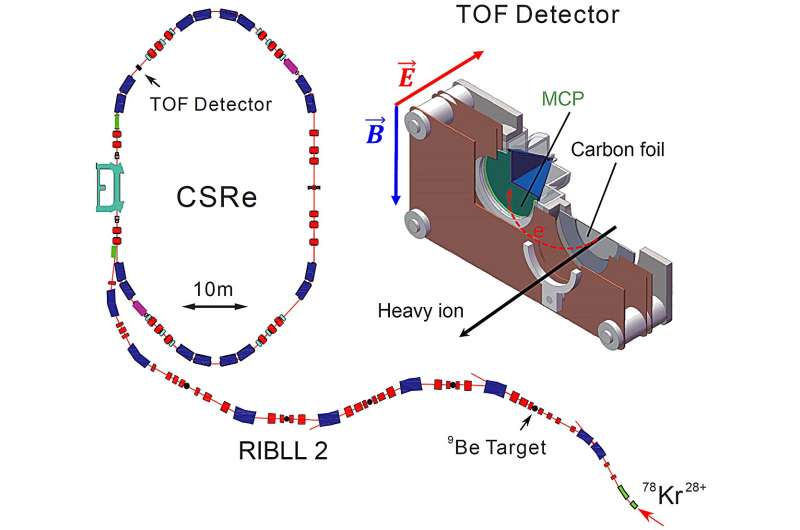
October 17, 2024 by Nuclear Science and Techniques
Collected at: https://phys.org/news/2024-10-technique-precision-short-atomic-nuclei.html
Researchers at the Heavy Ion Research Facility in Lanzhou (HIRFL-CSR) have introduced a technique, Tune-IMS, designed to improve the precision of isochronous mass spectrometry (IMS) in measuring short-lived atomic nuclei. The development offers refined data for nuclear structure studies and could have potential applications in astrophysics, nuclear energy, and medicine.
The Tune-IMS technique has proven its capability to enhance the mass precision of certain short-lived nuclei, such as 63Ge, 65As, 67Se, and 71Kr. Compared with the previous IMS method, it additionally utilizes betatron oscillation of the ions to further reduce the mass errors, which is particularly important for short-lived nuclides.
“Our method can achieve higher precision for isotopes that have been challenging to measure,” said Prof. Meng Wang, lead researcher on the project. “This may benefit ongoing studies in nuclear physics and related fields.”
The findings are published in the journal Nuclear Science and Techniques.
The improved precision provided by Tune-IMS may offer more reliable data for researchers studying nuclear reactions, which are important for understanding processes such as stellar evolution and the formation of elements in stars. More accurate mass measurements could also contribute to nuclear energy research, where precise data can enhance the efficiency of reactors and improve safety protocols.
In addition, the advancement may assist in nuclear medicine, where isotopes used in diagnostic imaging and therapeutic treatments require accurate mass data for stability and effectiveness.
 The comparison of CDEs for TZ = ±1/2 mirror pairs obtained by using experimental masses from AME20, CSRe2011, and this work. The dotted line denotes the result from a semi-classical approach. Credit: Han-Yu Deng
The comparison of CDEs for TZ = ±1/2 mirror pairs obtained by using experimental masses from AME20, CSRe2011, and this work. The dotted line denotes the result from a semi-classical approach. Credit: Han-Yu Deng Left: The standard deviation of the revolution time with (red filled triangles ) and without (black filled squares) the new technology. Right: The comparison of the re-determined mass values for the reference nuclides with (a) and without (b) the new technology. Credit: Han-Yu Deng
Left: The standard deviation of the revolution time with (red filled triangles ) and without (black filled squares) the new technology. Right: The comparison of the re-determined mass values for the reference nuclides with (a) and without (b) the new technology. Credit: Han-Yu Deng
Conventional isochronous mass spectrometry (IMS) has faced challenges in achieving high accuracy, particularly with short-lived nuclei. These limitations have been tied to the spread of magnetic rigidity in ions, which can affect the resolution of mass measurements.
The Tune-IMS technique addresses this issue by utilizing betatron oscillations, which reduce the spread in revolution times and thus improve measurement precision. This method has been successfully tested on several nuclides and has compared favorably with established IMS methods.
While Tune-IMS offers improvements, the current method requires the selection of specific oscillation values, which limits the number of ions available for analysis. The research team is developing a new time-of-flight detector with positional sensitivity to address this limitation, aiming to increase the method’s efficiency and applicability.
“By improving the sensitivity of our detectors, we hope to expand the range of nuclei that can be studied with Tune-IMS,” Prof. Wang noted.
The Tune-IMS technique represents a refinement in the precision of mass measurements for short-lived atomic nuclei, with potential applications in both fundamental nuclear research and practical fields like nuclear energy and medicine. Researchers at HIRFL-CSR plan to continue developing the technology to broaden its scope.
More information: Han-Yu Deng et al, Improved isochronous mass spectrometry with tune measurement, Nuclear Science and Techniques (2024). DOI: 10.1007/s41365-024-01580-5

Leave a Reply